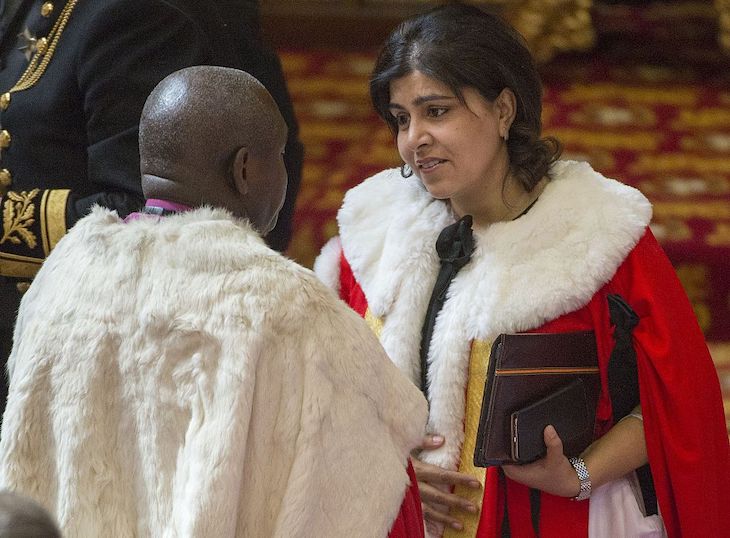There will be little surprise that Baroness Warsi has resigned the Conservative whip; the greater wonder is that she didn’t do so years ago. In her leaving, she complains ‘how far right my party has moved’, but then she has been making complaints about the Tories for years.
Warsi has never been slow to accuse the Conservatives of Islamophobia. In June 2020, for example, following the murder of three men in Reading by an Islamist extremist – an asylum-seeker from Libya – it was the then Conservative government which caught her ire. Describing the murders as a ‘lone wolf’ attack, she said: ‘How can the government seek the support of a community that it needs to deal with these challenges when it simply refuses to work with that community?’.
Warsi has never been slow to accuse the Conservatives of Islamophobia
In 2018, Warsi demanded an inquiry into Islamophobia within the Conservative party – and won her case. The report, conducted by former human rights commissioner Swaran Singh and published in 2021, concluded that some individual members did have an attitude problem towards Muslims but that the party was not ‘institutionally racist’ in this regard. Warsi rejected this conclusion.
Yet Warsi seems to have had a rather different view when it came to comments made against Rishi Sunak and Suella Braverman. Last month, she tweeted her support for a woman who had been acquitted of a public order offence after carrying a banner at a Palestine protest depicting Rishi Sunak and Suella Braverman as ‘coconuts’ – a derogatory term for someone accused of being ‘brown’ on the outside and ‘white’ on the inside. Warsi tweeted a picture of herself drinking from a coconut with the words ‘many, many congratulations’. A Conservative party investigation into Warsi beckoned. And now Warsi has resigned from the party.
Look back through Hansard over recent years and it is hard to find much in the way of support for Conservative policies, aside from some lukewarm endorsement of the ‘levelling up’ agenda. She was not slow, however, in February 2020 to accuse her party of refusing to accept an all-party Parliamentary group’s definition of Islamophobia. It is a theme to which she returned to many times after she resigned as a foreign officer minister in 2014, criticising the government for failing to condemn Israel for attacks on Gaza.
Did she stay in the Conservative party specifically in order to be able to condemn it from the inside for Islamophobia? One clue to her character was her announcement, a few days before the Brexit referendum in 2016, that she was abandoning the Leave campaign and switching sides after being repelled by its ‘toxic, divisive and xenophobic campaigning’, and accusing it of spreading ‘lies’ and ‘hate’. That would have had a little more force had anyone actually remembered Warsi being part of the Leave campaign in the first place. Her comments certainly had Daniel Hannan scratching his head, as he had once asked Warsi if she would join the Leave campaign and she had declined.
That does rather pose the question as to whether her ‘departure’ from the Leave campaign was part of a pre-planned strategy to embarrass it at the last moment, in the hope of changing voters’ minds. It also makes you wonder, too, whether Warsi’s continued membership of the Conservative party in recent years was similarly maintained as a means by which she could attack it for Islamophobia. If that was what she was up to, the nuclear option of trying to damage the party by resigning from it was only available to be used once. No longer will she be able to form the subject of all those ‘Tory peer criticises party for Islamophobia’ stories with which we have become so familiar.








Comments